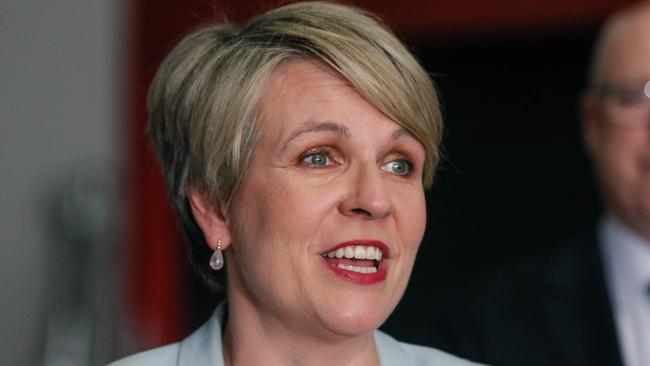National review to probe Northern Territory’s croc farming industry
The Environment Minister has announced national standards of handling and farming crocodiles will undergo a ‘long overdue’ review. Read what it means.
Northern Territory
Don't miss out on the headlines from Northern Territory. Followed categories will be added to My News.
The Territory’s lucrative crocodile farming industry and handling practices will go under the spotlight, the federal government has announced.
The national code of practice for the humane treatment of crocodiles, both wild and farmed, will be reviewed over the next 12 months.
It is not expected to lead to changes to skin exports nor respond to calls for a potential crocodile cull.
NT-based Centre for Crocodile Research managing director Dr Sally Isberg said while Territory industry and management teams all work “exceedingly well” the review was simply about updating the code, which has not been done since 2009.
“It is long overdue but the review, in my eyes, is nothing that should be feared because it is setting those minimum standards for crocodilians in our care,” she said.
“Improved animal welfare standards improves farm profitability.”

Dr Isberg said it was in a farmer’s “best interests” to look after their animals not only to keep their skin intact for leather products but to prevent disease and improve survival rates.
“The majority of crocs on farms are sourced from the wild eggs … it’s a fantastic conservation model that we’ve been using for over 40 years,” she said.
“With every egg collected, a royalty is paid back to the land owners … and it protects the habitat of other species that also live within the crocodile habitat.
“What also happens is that in the wild, the vast majority, about 90 per cent, die during nesting (due to) flooding and predations, lizards and those kinds of things that come through and dig up the eggs to eat.
“By collecting the eggs and taking them back into the incubator on the farm … we get about 86 per cent hatch rate.”

Environment and Water Minister Tanya Plibersek said the review would modernise the code, which includes standards on how to house and handle the reptiles plus minimise the risk of injury to handlers and crocs alike.
“As the Australian crocodile industry continues to grow it is important that we have contemporary and nationally consistent standards for the humane treatment of these unique reptiles,” she said.
“There are currently 21 commercial crocodile farms in Australia and it is vitally important that we uphold the standards we have set for a responsible and sustainable industry.
“This review will ensure that the minimum standards and expectations are up to date, accessible and consistently applied across Australia.”
Chief Minister Natasha Fyles said the review panel would include government and industry experts.
“It’s a really important industry for the Northern Territory, it provides opportunities for jobs, particularly jobs out in our regions,” she said.
“We look forward to that work being undertaken and ensuring the Northern Territory’s perspective is clearly heard.”
While the review is unrelated to calls for a crocodile cull, Ms Fyles said she would “certainly be raising” that prospect again with Prime Minister Anthony Albanese as she visited Canberra this week.




